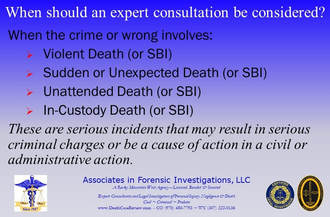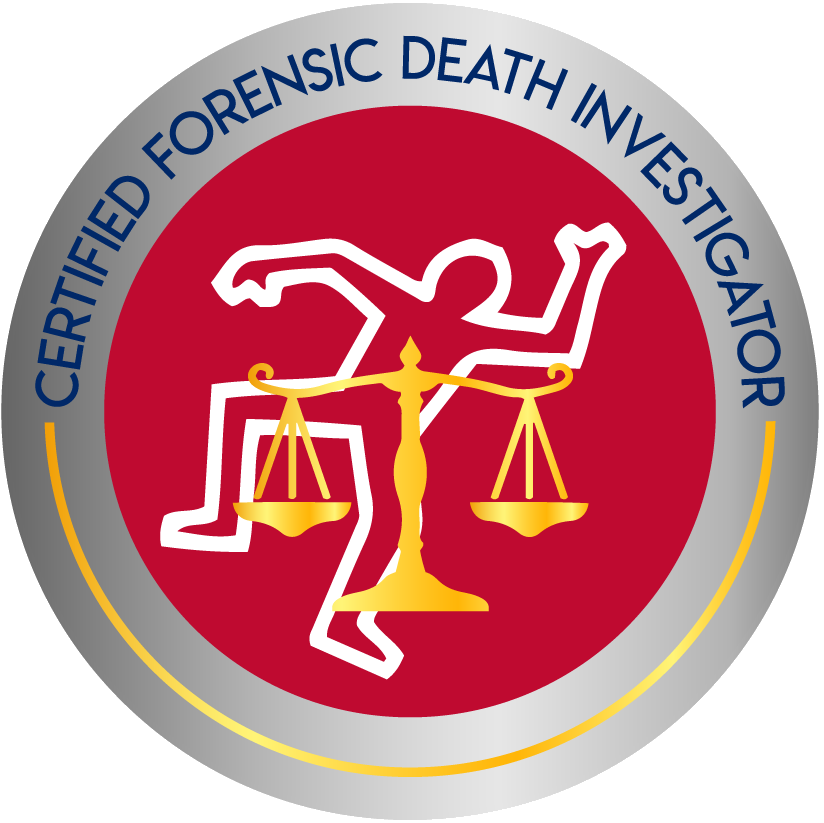
We are often contacted for advice on having an autopsy performed, finding a forensic pathologist, or having our agency and/or forensic pathologist conduct a review of records, reports and photographs in a criminal or civil case for pre- and active litigation. Many find it interesting the options available to them – or not available. The first question to ask is – is the body available for autopsy; and the second is – was an autopsy performed? The only thing that prevents an autopsy is cremation. An autopsy can be performed on an embalmed body, including exhumed weeks to years - even decades - later. Embalming does present issues; however, these are addressed by the forensic pathologist.
What are the available options for an autopsy? First, autopsy is from the Greek, ‘autopsia’ – “to see with one’s own eyes”. We recommend having a board certified forensic pathologist conduct any autopsy in potential litigation. Other specialties involve the hospital and medical setting – which involves clinical and anatomical pathology. A forensic pathologist, often cross trained and certified in both clinical and anatomical pathology, has the added education and training in areas of injury and injury causation to determine the cause and manner of death; such as our consulting forensic pathologist. In addition, we recommend a member of the National Association of Medical Examiners (www.theNAME.org). Areas of additional medical education and specialized training for the forensic pathologist includes toxicology, firearms and ballistics, blood analysis, and trace evidence, including DNA, collection.
The forensic autopsy includes a review of the medical history, crime scene evidence, evidence of injury or disease, and medical and trace evidence. A forensic pathologist is available to all parties – prosecution, plaintiff, and defense. In addition, a forensic pathologist is available for clinical consultation – examination of living persons – very important and valuable to surviving victims of serious bodily injury. The primary distinction between a fatal and non-fatal event can be fractions of an inch. We treat all SBI cases the same as death cases. Finally, we also recommend an expert medicolegal death investigator be present to document any autopsy requested.
An autopsy, to see with our own eyes, is available in the following manners:
- Private autopsy – if an autopsy has not been completed or the case is not in the jurisdiction of the medical examiner / coroner;
- Second full autopsy – if an autopsy, forensic or medical only, has been completed and an independent full forensic autopsy is needed. This includes exhumations;
- Forensic Pathology Review – if an autopsy has been completed, however, the body is not available for a second autopsy (cremated, not exhumed, logistically not available); and
- Forensic Body Documentation – whether previously autopsied or not, and the body is available, the body can be documented by photographs, video, diagramming, and any additional evidence collection.
There exists standards and protocols for when to conduct forensic autopsies, the process of both the forensic autopsy and the death investigation, as well as accepted usual practices for each. As part of our consultation in death cases, we review the processes of the official investigation.
Private Autopsy
If an autopsy has not been completed or the case is not in the jurisdiction of the medical examiner / coroner, the next-of-kin can request a private autopsy. As most deaths are not subject to autopsy, the family may have questions to be answered by autopsy. It is recommended that any unexpected death be autopsied; however, from budgets to forensic pathologist availability, most are not. As an example, we often see fatal motor vehicle collisions or law enforcement determined suicides not autopsied, as it is believed the cause and manner of death are known by investigation. We have written extensively on the errors of these ways.
A private autopsy is authorized and paid for by the next-of-kin, and conducted by an independent forensic pathologist. Consulting with a forensic pathologist in advance will assist in determining if a forensic autopsy is possible and potentially informative, or if another available option is better.
The private autopsy is conducted in the same manner as the medical examiner / coroner authorized autopsy. This includes gross external examination, and internal examination of the body, toxicology, and microscopic tissue examinations. The forensic pathologist will also request the decedent’s medical history, and circumstances of their death. We also recommend an expert medicolegal death investigator assist with the autopsy and investigative processes, much as a medical examiner / coroner system has available.
Second Full Autopsy
If an autopsy has been completed or the case is not in the jurisdiction of the medical examiner / coroner or private autopsy – and may include exhumation, the next-of-kin can request a private autopsy. A second autopsy is most common when there is a claim or dispute in the findings of the original autopsy. In media, we see this in potentially high-profile cases – such as law enforcement involved deaths. We may also see these where it is believe the first autopsy missed something, or did not conduct a specific test or examination, or where new evidence has been found and a second autopsy is necessary.
A second autopsy is also conducted as a Private Autopsy (above) and is also limited to the body being available, which would include embalmed and exhumed bodies. Being embalmed presents some issues, but does not hinder a second autopsy or findings. As with the original autopsy, the forensic pathologist will also request the decedent’s medical history, and circumstances of their death. In addition, they will dissect their own tissue for microscopic examination, and specimens for toxicology; they will also likely re-examine and test specimens from the original autopsy in microscopy and toxicology. In addition, we also recommend an expert medicolegal death investigator assist with the autopsy and investigative processes.
Forensic Pathology Review
If an autopsy has been completed, however, the body is not available for a second autopsy (cremated, not exhumed, logistically not available, or a forensic pathologist is unavailable) or there was no autopsy, there are alternatives, the first of which is an independent review by a forensic pathologist. This review would include the original autopsy report, toxicology results, medical history and circumstances of death as known at the time of the original autopsy.
Based on the findings of the review, or in consideration of the circumstances in litigation, the forensic pathologist may recommend also doing an independent examination of any retained specimens for microscopy and toxicology. This review, and additional independent examination, are as close to a second autopsy as can be done, without having the body to examine. Of course, any autopsy without a body is subject to the limitations of not being able to examine first-hand, as well as retain their own specimens. We also recommend an expert medicolegal death investigator assist with the review of the official investigative records, reports, and photographs with the forensic pathologist.
Forensic Body Documentation
As with the Forensic Pathology Review (above), the body can be documented by photographs, video, diagramming, and any additional evidence collection. A forensic pathologist may provide this service, or it is most often provided by an expert medicolegal death investigator. Due to the nature of the evidence, documentation, examination, and potential testimony, we recommend this be done with expert experience considered. There are specific steps and protocols to follow, as well as potential evidence to look for in the examination and documentation.
What Steps to Follow
Each of these available options – from autopsy to review – can be conducted at a morgue or funeral home setting, dependent on what is logistically available. To further the findings of an unexpected death involved in litigation, time is of the essence and immediate action must be taken, to include:
- Obtain notarized consent from the next-of-kin or court order;
- Provide an immediate letter of preservation, or court order, to the medical examiner / coroner’s office and/or funeral home or other custodian of the body;
- Provide an immediate letter of preservation, or court order, to the medical examiner / coroner’s office, funeral home, hospital or other custodian of the tissue (histology) and toxicology specimens; and
- Make immediate arrangements with a board certified forensic pathologist and/or expert medicolegal death investigator.
Our goal is to provide you with the utmost in privacy, confidentiality and our professional attention to your legal investigation and expert consultation needs. You can learn about us at www.DeathCaseReview.com/Attorneys.html for details, CVs, and information packets.
If we can be of assistance in any death or personal injury consultation or investigation, please contact our office at your convenience and visit www.DeathCaseReview.com/sample-cases.html for cases we have worked. We welcome your inquiries and the opportunity to assist you.
A synopsis of our expert consultations is best described as:
"Expert [Forensic / Medicolegal / Death] Investigator to review the records, reports, photographs and evidentiary documentation in order to provide a non-medical forensic expert opinion, within the scope of their education, training and experience, as to the totality of the circumstances of the fatal and non-fatal event and the competence of the official investigation, with respect to death investigation protocol and standards."
In addition, we have an affiliated consulting Forensic Pathologist and a Forensic Toxicologist available for additional, and medical specific, expert consultations – including all protocols and options presented here.
We invite you to contact us at your convenience for the opportunity, and to introduce you to the Associates in Forensic Investigations experience.
-----
Dean A. Beers, CLI, CCDI, CFI-FTER and Karen S. Beers, BSW, CCDI, CFI-FTER
Colorado Licensed Private Investigators (PI2.050 and PI2.019)
Cheyenne WY Licensed Private Investigators & Security (31146)
Board Certified Legal Investigator / Expert Consultant
Board Certified Criminal Defense Investigators
Board Certified Forensic Interviewer-Forensic Testimonial Evidence Recovery
Certified in Medicolegal Death Investigations / former Deputy Coroners
Associates in Forensic Investigations, LLC
A Rocky Mountain West Agency
Expert Consultants and Legal Investigators
Personal Injury, Negligence & Death in Civil, Criminal and Probate Litigation
www.DeathCaseReview.com ~ [email protected]
CO - (970) 480-7793 Office / TXT and (970) 480-7794 Fax
WY - (307) 222-0136 Office / TXT and (307) 222-0138 Fax
'Quaero Indicium' - To Find The Evidence



